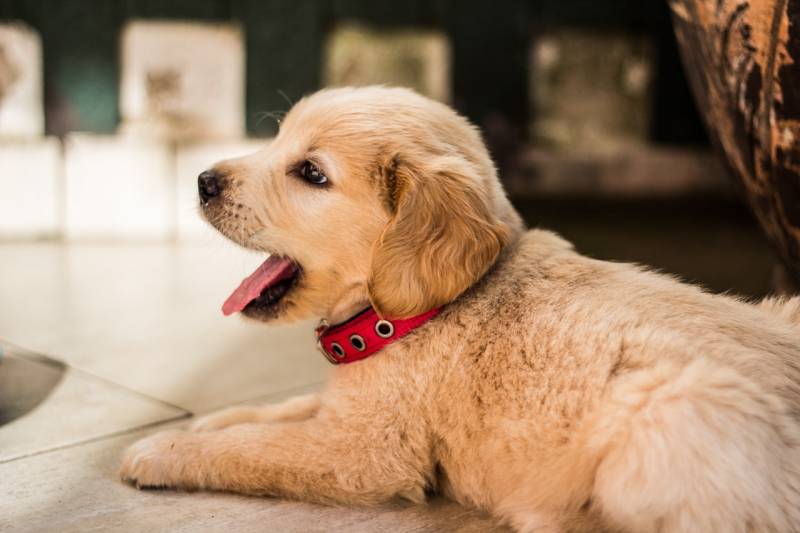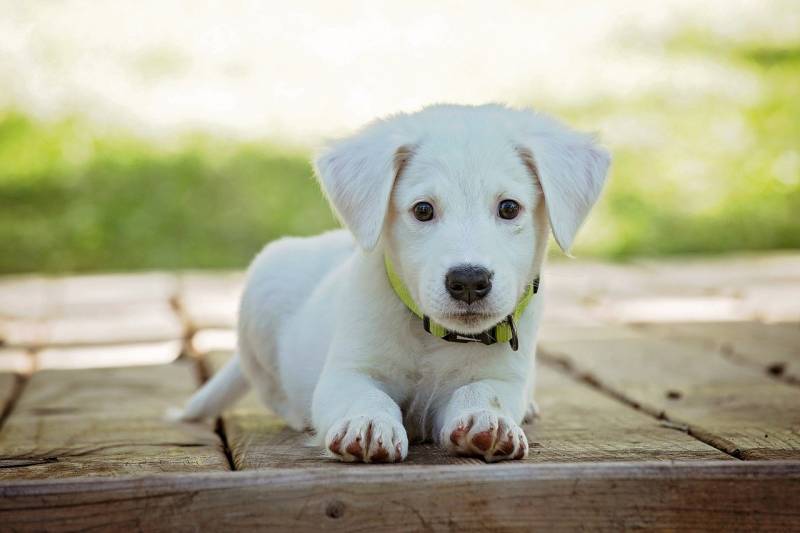Quick Navigation

Having a new puppy can often be compared to having a new baby. It will not understand when to sleep, when to play games or where to go to the toilet.
If you are to introduce a new puppy into your home, you need to understand that it will, most of the time, drain your energy and suffocate your routine.
A new puppy sometimes declines to eat or adjust to your preferred diary. So, hope for the best, but prepare for the worst.
Most pet parents have confessed that new puppies cause absolute mayhem in the house when left alone. Some parents have admitted that new puppies chew kids’ house slippers and relentlessly prune embellished Camelia bushes.
Puppies need to manifest attention. This attention usually causes not only physical stress but mental stress and anxiety.
Here, we will look at a few details you need to understand all it takes to raise a new puppy and what you can do if your Puppy is causing you a lot of enervation.
How Can A Puppy Disrupt Your Everyday Routine?
This is a question that many pet parents ask. Luckily, the answer is, “It all depends on the puppy’s age.” Different puppy stages will cause altered interruptions in your daily routine.
Below are two puppy stages that need keen attention;
Very young pups, like 6-8 weeks old, will follow you anywhere and everywhere. As a pet parent, when your young Puppy is curious, she might follow you straight to the road and meet either older and aggressive dogs or hooligan drivers.
It can be exhaustive to continuously keep an eye on your Puppy whenever you leave the house.
Advice: When dealing with a young pup, you need to keep a keen eye and make sure that it does not stray away from the house. Constantly check that she is kept in a separate puppy house or safely locked inside the house.
For the much older pups, let’s say above two months old, they will be curious and frantic. New puppies take up to three weeks to adjust to new environments.
Older puppies will make noise during their first few days in a new environment causing sleepless nights or even distress with your neighbors.
It is essential to familiarize the Puppy with its new home. It would help if you also interacted with the Puppy slowly to make it adjust to the environment.
Do not force the Puppy to interact with children (if there are any). Enthusiastic children can cause the Puppy to be more frightened, causing woes and destruction.
How A New Puppy Affects Your Daily Routine
Having a new puppy will mean changes to your daily routine. Therefore, you need to adjust accordingly.
New puppies need to be fed, nursed, and groomed regularly.
As the pet parent, this continuous attention modifies your working schedule negatively.
For instance, you used to wake up at 6 am and get ready for work by 7 am when you did not have a puppy. Now, it means that you will start to wake up earlier to prepare for work while having enough time to prepare food for your puppies.
A strict working routine and schedule must be followed to balance your time and the Puppy’s time.

Dog’s Daily Routine
These routines will help you manage time and reach an understanding with your Puppy as it grows. You should know practices include; feeding, exercise, resting, and toilet techniques.
Once your new Puppy adjusts to the daily routine, you can worry less about physical draining.
Below are four routines that cause physical exhaustion, and their solutions
Feeding time
It is always stressful either deciding on the feeding schedule or the recommended puppy feed for your new Puppy.
Puppies and dogs need to be fed at the same time every day.
However, these feeds should be high-quality additions to boost their immune systems and build strong body structures.
Puppies, unlike mature dogs, should feed three times a day.
Puppy feeding fundamentals include:
- 6-12 weeks old pups should be fed Puppy feeds strictly
- 3-6 months old puppies feed three times a day. These feeds can consist of a mix of puppy feed and energy-feed bones.
- 6-12 months old puppies should start to feed twice a day. These feeds can include nutrient-rich puppy food and adult maintenance foods.
- After age 1: Most owners feed adult dogs two half-portions a day
Toilet time
Taking your Puppy out to the toilet is usually exhausting. Puppies will often go to the bathroom 30 minutes after they have been fed.
Taking your Puppy to the toilet is another opportunity to take it for some strolls.
There are many toilet training tips on the internet that help teach your puppies when to go to the toilet.
Read ONLY PROVEN and TRUSTED links for efficient outcomes.
Exercise time
Having to go with your dog for exercise regularly means having to do physical activities with her.
It would help if you understood that these exercises depend on the Puppy’s size, age, and breed.
Different dog breeds require other physical exercises. If your Puppy is hyper and energetic inside the house, you need to increase her physical activity outside.
Take your Puppy outside more often, and allow it to run up and down as she pleases. These activities help her calm down once you get inside the house.

Resting time
After taking your Puppy out for exercise, it now gets to resting time. Allow your Puppy ample time to relax and sleep utterly.
When she is resting, you can carry out your routine, like cleaning the house or attending to your work-related assignments.
Daily Routine Chat
The daily routine chat can change depending on your working schedule.
Pet parents with a tight schedule can adjust the timing according to their preferences.
TIME | ACTIVITY |
08:00 | Take your Puppy outside to go to the toilet |
08:30 | Give your Puppy a healthy breakfast |
09:00 | Take her out for a walk. This is also the perfect opportunity for her to go to the play around |
10:00 | Allow your Puppy to settle down calmly |
14:00 | An ideal time for your pup to take its midday meal and go for a short exercise/toilet |
18:00-19:00 | A perfect time to let your Puppy outside the house run around as you were its bowl and clean its puppy home |
Common Puppy Problems That Usually Cause Fatigue
Dog parents have confessed the following similar puppy challenges they faced during the pups’ upbringing stage:
1. Separation Anxiety Struggles
Almost all new puppies will whine and bark when left alone. As you prepare to leave for work, you will often leave your Puppy locked up in its room.
This act will not only leave you worried about what will happen to your pup but also about how she is going to cope alone.
The first few weeks can prove to be a challenging task for you and the Puppy. However, with time, it will adjust to the environment, and the Puppy will stop barking and howling.
2. Toilet Training
Above, we looked at the challenges involving toilet training. Puppies need to be trained well when it comes to toilet trepidations.
The toilet training process is exhausting. She will constantly forget where to poop and what time to pee.
As a trainer, you must understand the Puppy’s feeding habits and routine beforehand to make this process stress-free.
3. Hyperactivity
Hyperactivity in puppies includes constant activeness in the pup. She will not just sit still when left alone.
Most puppies with hyperactivity disorder will chew, eat feces, nip garments, and lack house-training behavior.
You are advised not to give your Puppy too much freedom if you want to tame her.
Some signs of hyperactivity and impulsiveness include:
- Aggressiveness
- Wandering
- Unable to sit still, especially in calm or quiet surroundings
- Fidgeting
- Excessive physical movement
- Excessive barking
- Acting without thinking
Five Tips For Eliminating Exhaustion Once You Have Adopted A New Puppy
A few tips can help you adjust to life with the arrival of a new pet.
Here are five tips that can help you adjust accordingly:
- It would help if you were true about your children’s pet-care abilities and skills.
- In all instances, when you have to leave your Puppy alone for an extended period (either overnight or a few days), you should arrange for Hull in-home pet sitting.
- Embrace “fun activities” with your Puppy every day.
- Always give your Puppy treats and praise whenever they do something right. Treats and praise heighten the learning process for dogs and most pets.
- Do not let your children give too much attention to the Puppy. Puppies get overwhelmed when they are continually given attention without some time off.
Relax and Let someone Puppy sit Your Dog!
Although it’s a sad feeling, there’s nothing wrong with taking a short break from your Puppy to rest.
The great thing about puppies is that they’re a lot of fun and easy to take care of.
Although many puppy sitters would jump at the chance to spend quality time with an adorable puppy, always look out for a trained puppy sitter.
Regular puppy sitting gives you free time to relax and enjoy. It also contributes to your dog’s socialization by training them to be comfortable around different people and dog breeds.
Conclusion
With the above details, you can now easily handle your Puppy, no matter how stressful it can be.
Follow the laid down procedures, and the Puppy can grow and differentiate between right and wrong.
If your Puppy still shows signs of stubbornness even with the above guide, contact your vet or dog expert and let them assist.
Remember, IT’S BETTER TO REWARD GOOD BEHAVIOR THAN TO QUASH ANY BAD BEHAVIOR.
The rewards can include dog biscuits or Scooby snacks.

Purrfect n’ Pawesome is the brainchild of Amanda, who has been into researching and writing about pets to help other pet parents in nurturing their adorable pets. Currently, she runs Purrfect n’ Pawesome along with her team of experienced and dedicated pet experts. Along with being an awesome writer and entrepreneur, Amanda is a cat mom to two innocently spoiled cats, Balanca and Scruffy.
She has been writing about pet care and nurturing and wants to share her readers’ experiences, learnings, and knowledge.
Over the years, she had the opportunity to work with various pet owners having multiple breeds, and that exposure gave her experience and the lessons of a lifetime.
Her family, her entire universe revolves around her two cats, who give her endless support and inspiration to move ahead with her objectives in life. Amanda is a live example of a balanced approach to all parenthood questions we all face in life.
